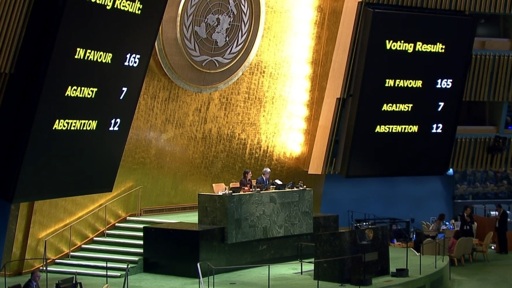Despite pressure exerted in recent weeks by the Trump administration’s diplomatic service, the United Nations General Assembly once again condemned the economic and commercial blockade that the United States has imposed on Cuba since the 1960s. This marks the 33rd time that the highest international representative body has demanded an end to the blockade. However, Washington’s actions did have a relative, albeit minor, impact on the final outcome of the vote.
In 2024, the resolution calling for an end to the embargo on the island received 187 votes in favor, two against (the United States and Israel), and one abstention from Moldova. This year, on behalf of Latin America (an area where the Trump administration has directed significant diplomatic efforts), Argentina and Paraguay joined the votes against, while Ecuador and Costa Rica abstained, countries that have historically defended the right to self-determination of nations and non-interference in their internal affairs. In addition, several Eastern European countries, including Poland, the Czech Republic, Estonia, Lithuania, and Latvia, abstained from voting in favor, citing that Cuba supports Russia in the war in Ukraine.
Despite these marginal positions, Cuba continues to receive the support of almost all member states. In total, 165 votes were in favor of ending the blockade, seven against, and 12 abstentions.
“We will continue to denounce this infamy and abuse. We will exercise our right to decide our destiny with determination. We will continue our efforts to overcome our current difficulties and ensure the economic sustainability of the country, even with the continuation and strengthening of the blockade… Cuba will not surrender!” said Cuban Foreign Minister Bruno Rodríguez during the debate at the United Nations General Assembly.
Pressure from Washington
Several days ago, Rodríguez denounced that the Trump administration had initiated a series of conversations in several countries around the world to get them to change their vote in the upcoming election. In this regard, the top Cuban diplomat said that the United States had even tried to pressure several governments to change their vote. He also said that Washington had made several slanderous statements about the Cuban government’s actions in order to persuade countries that had historically voted against the blockade to change their diplomatic position on the issue.
The US ambassador to the United Nations, Mike Waltz, publicly stated, for example, that the blockade does not actually exist; that the Cuban economic crisis is the sole responsibility of the Cuban government; that the resolution condemning the blockade is propaganda; that Cuba has complete freedom to negotiate with other countries; etc. These statements have been harshly criticized and denounced as fallacious.
In this regard, Cuban President Miguel Díaz-Canel wrote in X: “‘The lies of Mike Waltz’ is how the failed Yankee ambassador to the UN should be remembered today, in his frustrated attempt to convince with grotesque anti-Cuban lies, and unable to defend his pamphleteering speech in the face of our foreign minister’s forceful response.”
For his part, Rodríguez said: “The Permanent Representative of the United States is not only lying, substantially straying from the topic, but he is also speaking rudely and, contrary to his president, against the dignity of the assembly and the member states. He is doing so in an uncivilized, crude, and rude manner. That is not acceptable in this democratic forum. Mr. Waltz, this is the United Nations General Assembly. It is not a Signal chat, nor is it the House of Representatives.”
For now, several analysts assume that the United States will continue its efforts to progressively reduce the support Cuba receives each year. The Trump administration will undoubtedly try to reduce the number of votes in favor of the resolution, which, on 33 occasions, has called for an end to one of the longest economic and trade blockades in history. However, Cuba bases its claim on universal principles of international law, diplomatic justice, and the denunciation of a blockade that has cost hundreds of thousands of dollars to an island that, despite the obvious difficulties imposed from abroad, continues on the path laid out since the 1959 Revolution.
The post The world once again condemns the blockade against Cuba appeared first on Peoples Dispatch.
From Peoples Dispatch via this RSS feed


